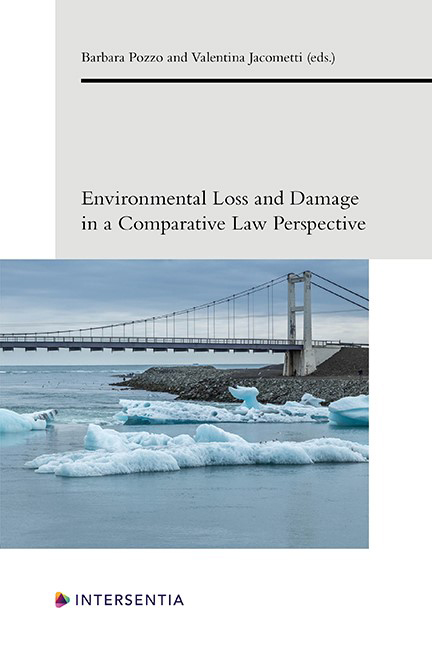Book contents
- Frontmatter
- Preface
- Contents
- List of Authors
- PART I LIABILITY FOR ENVIRONMENTAL HARM IN THE EU
- PART II PRIVATE AND CORPORATE ENVIRONMENTAL LIABILITY
- PART III THE ROLE OF CRIMINAL LIABILITY
- PART IV LEGAL TRANSPLANTS IN THE ENVIRONMENTAL FIELD: THE CASE OF ENVIRONMENTAL LIABILITY
- PART V STATE AND INTERNATIONAL ENVIRONMENTAL LIABILITY
- PART VI CLIMATE CHANGE LIABILITY
- PART VII LIABILITY, CLIMATE CHANGE AND NATURAL HAZARDS: THE ROLE OF INSURANCE
- PART VIII REAL COMPENSATION AND OFFSET REGIMES: THE STRATEGY OF “NO NET LOSS”
- About the Editors
Corporate Social Responsibility and Corporate Liability for Environmental Damage
Published online by Cambridge University Press: 26 May 2021
- Frontmatter
- Preface
- Contents
- List of Authors
- PART I LIABILITY FOR ENVIRONMENTAL HARM IN THE EU
- PART II PRIVATE AND CORPORATE ENVIRONMENTAL LIABILITY
- PART III THE ROLE OF CRIMINAL LIABILITY
- PART IV LEGAL TRANSPLANTS IN THE ENVIRONMENTAL FIELD: THE CASE OF ENVIRONMENTAL LIABILITY
- PART V STATE AND INTERNATIONAL ENVIRONMENTAL LIABILITY
- PART VI CLIMATE CHANGE LIABILITY
- PART VII LIABILITY, CLIMATE CHANGE AND NATURAL HAZARDS: THE ROLE OF INSURANCE
- PART VIII REAL COMPENSATION AND OFFSET REGIMES: THE STRATEGY OF “NO NET LOSS”
- About the Editors
Summary
INTRODUCTION
For decades, transnational corporations have been involved in environmental disasters or continuous environmental degradation, in particular in the “Global South” where public law standards and/or enforcement are weak. The chemical accident in Bhopal, chemical and asbestos contamination in South Africa or oil pollution in Nigeria have led to spectacular transnational tort liability cases against parent companies in the “Global North”, such as Union Carbide, Thor Chemicals, Cape plc or Royal Dutch Shell, which however have had very limited success. Whereas some environmental liability laws, especially in the US and in Europe, have established a certain parallelism between control (of operations) and liability, and therefore parent companies can be regarded as “operators” of a polluting production site, their geographical spread is limited and traditional tort law has for a long time been reluctant to assign liability to parent companies.
While no international agreement on the environmental (and social) responsibility of transnational corporations could be reached until now, private standards on the subject matter have emerged in many industries, today often referred to as corporate social responsibility (CSR) standards. They were, however, largely regarded to be voluntary and outside the legal sphere.
Recently, the picture has begun to change. On the one hand, public (international) law is increasingly assigning responsibility to parent companies and to “leading” companies in transnational production chains. In particular, the UN Guiding Principles on Business and Human Rights, although formally soft law, are in the process of being implemented in a number of European jurisdictions.
On the other hand, recent developments in tort law, most importantly in the English cases of Chandler v. Cape (concerning asbestos exposure of a subsidiary's employee) and Vedanta (concerning serious environmental degradation resulting from a copper mine in Zambia) point towards increased liability of parent companies. In this context, the tort law relevance of CSR or environmental self-regulation has explicitly been discussed in the two recent cases of Vedanta and Okpabi (the latter concerning serious environmental degradation resulting from oil spills in Nigeria).
This chapter analyses the legal relevance of transnational CSR or environmental self-regulation and best practices for the liability of parent companies in the light of recent tort law developments, and in particular for the establishment of a duty of care of parent companies towards the neighbours of industrial production of subsidiaries or supplies in the Global South.
- Type
- Chapter
- Information
- Environmental Loss and Damage in a Comparative Law Perspective , pp. 111 - 132Publisher: IntersentiaPrint publication year: 2021



